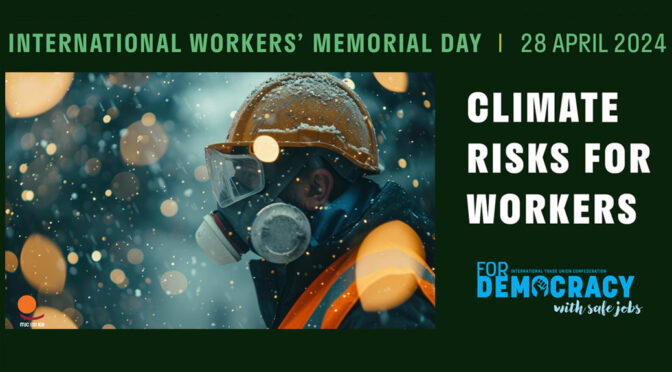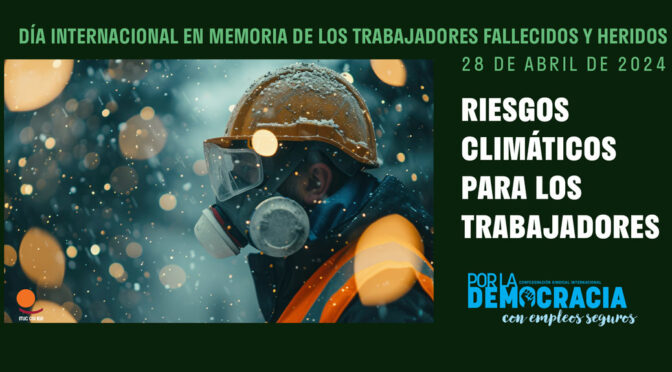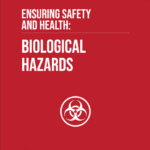#iwmd24 | Climate risks for workers | ITUC International Workers’ Memorial Day/Day of Mourning theme announced
The climate crisis is creating new and heightened occupational risks to workers, the International Trade Union Confederation (ITUC) is warning.
Extreme weather and changing weather patterns are affected job security and health for workers, the global union body says. In response to the crisis, it says, the theme for International Workers’ Memorial Day on 28 April 2024 will be ‘Climate risks for workers’.
Heat-related deaths and diseases in workers in agriculture, construction and other outdoor jobs have soared, ITUC notes. It adds work in extreme weather can cause fatigue and increases in workplace injuries and stress-related disease. Elevated levels of airborne pollution associated with heatwaves can lead to increased hospitalisations and deaths, it warns. And it adds higher UV exposures place workers at risk of chronic health problems, including skin cancer and eye damage (macular degeneration).
The ITUC alert comes in the wake of climate-related health warnings from UN agencies. A World Health Organisation (WHO) December 2023 statement noted the year had witnessed “an alarming surge in climate-related disasters, including wildfires, heatwaves and droughts, leading to the displacement of populations, agricultural losses and heightened air pollution. The ongoing climate crisis has significantly increased the risk of life-threatening diseases such as cholera, malaria and dengue.”
A September 2023 International Labour Organisation (ILO) just transition policy brief, Occupational safety and health in a just transition, noted the climate crisis “without proper controls in place, may increase the risk for injury, disease and death for workers due to heat stress, extreme weather events, exposure to hazardous chemicals, air pollution and infectious disease, among others.”
ILO added: “Numerous health effects on workers have been linked to climate change, including injuries, cancer cardiovascular disease, respiratory conditions, and effects on their psychosocial health. There has been an increase in the estimated number of deaths among the global working-age population due to exposure to hot temperatures.”
ITUC notes that climate change is also putting workers at increased risk from infections. “The climate crisis, urbanisation and changing land use are impacting on occupational health and safety and have led to biological hazards posing new risk or risks in new places,” a December 2024 ITUC briefing on biological hazards notes.
It is a point reinforced in the ILO just transition policy brief, which warns “risks from vector-borne diseases, such as malaria or dengue fever, will increase with warming temperatures, including potential shifts in geographic range of these vectors as a result of climate change.
“This development affects all workers, especially outdoor workers who are at higher risk of contracting vector-borne diseases, from vectors such as mosquitoes, fleas and ticks. Moreover, infectious diseases may also affect workers via waterborne and foodborne pathogens, such as Salmonella spp. when they have direct contact with contaminated water or food.”
ILO has said it will commemorate World Day for Safety and Health at Work on 28 April, and will follow the theme adopted by ITUC and unions worldwide, focusing on “the impacts of climate change on occupational safety and health”. ILO added it will produce supporting promotional materials including a poster and report and will organise a global event with experts and guest speakers from governments, employers and workers “to discuss how to protect workers and respond to this global challenge.”
ITUC will produce its own guides and social media resources which will be available on its dedicated International Workers’ Memorial Day website, www.28april.org
Resources
ITUC climate change webpages.
ITUC global shifts – just transition webpages.
Hazards climate and workers’ health webpages.



